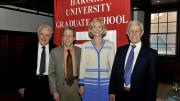The Graduate School of Arts and Sciences Centennial Medal, first awarded in 1989 on the occasion of the school’s hundredth anniversary, honors alumni who have made contributions to society that emerged from their graduate study at Harvard. This year’s honorands are Shakespeare scholar David Bevington ’52, Ph.D. ’59, a professor emeritus at the University of Chicago; Stephen Fischer-Galati ’46, Ph.D. ’49, a specialist in East European history and civilization and a professor emeritus at the University of Colorado; economist and 2007 Nobel laureate Eric Maskin ’72, Ph.D. ’76, of the Institute for Advanced Study; and classical philologist Martha Nussbaum, Ph.D. ’75, professor of law and ethics at the University of Chicago.
Fuller biographies, followed by the citations read upon awarding the medals, appear below.
David Bevington ’52, Ph.D. ’59, English
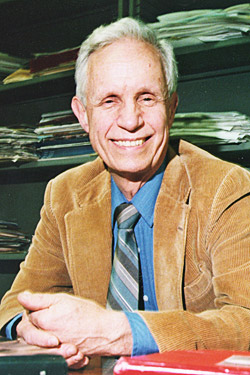
Courtesy of David Bevington
David Bevington
David Bevington is the Phyllis Fay Horton Distinguished Service Professor Emeritus in the Humanities at the University of Chicago, where he has taught since 1967. One of the world’s foremost scholars of Shakespeare and Renaissance drama, Bevington has written or edited more than 30 volumes on Shakespeare and his contemporaries. His authored books include From “Mankind” to Marlow: Growth of Structure in the Popular Drama of Tudor England (1962); Action Is Eloquence: Shakespeare’s Language of Gesture (1985); and Shakespeare's Ideas: More Things in Heaven and Earth (2008). His new book, forthcoming from Oxford University Press, is Murder Most Foul: The History of Hamlet. Bevington has edited the Bantam Shakespeare, in 29 volumes (1988, now being updated), and Longman’s Complete Works of Shakespeare, sixth edition (2009). He is the former president of the Medieval and Renaissance Drama Society (1981-1986), the Shakespeare Association of America (1976-7 and 1995-6), and the Renaissance English Text Society (1977-1980). He is senior editor of the Revels Plays (Manchester University Press), which publishes critical editions of plays of Shakespeare’s contemporaries, and the Revels Student Editions. He was senior editor of the Norton Anthology of Renaissance Drama (2002) and is one of three senior editors of a forthcoming Cambridge edition of The Works of Ben Jonson.
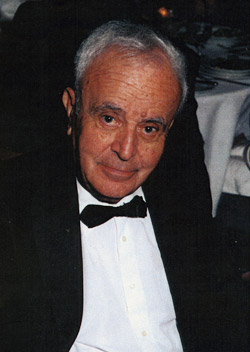
Courtesy of Stephen Fischer-Galati
Stephen Fischer-Galati
Stephen Fischer-Galati ’46, Ph.D. ’49, history
Stephen Fischer-Galati is Distinguished Professor Emeritus of History at the University of Colorado. He is the founder, publisher, and principal editor of the scholarly journal East European Quarterly and the scholarly series East European Monographs, which has put out nearly 800 scholarly books on East-Central Europe in collaboration with Columbia University Press. Galati is one of the world’s foremost specialists on East European history and civilization, exploring the evolution of East-West relations and the intersection of Western and Eastern political and cultural developments. He has also published extensively on Balkan issues and guerilla warfare in the region. Born in Romania, Galati escaped the country as a teenager during the early stages of World War II, finishing his high-school studies in Massachusetts before going on to Harvard. His books include Romania: A Historic Perspective; Eastern Europe and the Cold War: Perceptions and Perspectives; and Man, State and Society in East European History, and he has authored more than 250 articles. He holds several honorary degrees and major grants and fellowships from American and international scholarly foundations. He is also the president of the International Commission of East European and Slavic Studies of the International Congress of Historical Studies.
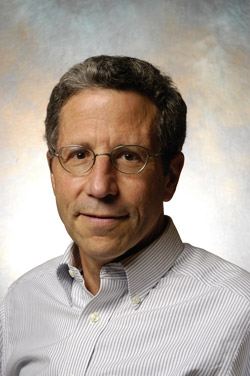
Courtesy of Eric Maskin
Eric Maskin
Eric Maskin ’72, Ph.D. ’76, applied mathematics
Eric Maskin is an economist and a 2007 Nobel laureate recognized (along with Leonid Hurwicz and Roger B. Myerson, Ph.D. ’76, applied mathematics) “for having laid the foundations of mechanism design theory.” Among other critical applications, that theory has helped economists identify efficient trading mechanisms, regulation schemes, and voting procedures. Maskin is the Albert O. Hirschman Professor of Social Science at the Institute for Advanced Study and a visiting lecturer with the rank of professor at Princeton University. After earning his doctorate at Harvard, Maskin went to the University of Cambridge in 1976, where he was a research fellow at Jesus College, and then taught at MIT (1977-1984) and at Harvard (1985-2000), where he was the Louis Berkman Professor of Economics. His work in economic theory, including game theory, the economics of incentives, and contract theory, has deeply influenced diverse areas of economics, politics, and law. He is particularly well known for his papers on mechanism design/implementation theory and dynamic games. His current research projects include comparing different electoral rules, examining the causes of inequality, and studying coalition formation. He is a Fellow of the American Academy of Arts and Sciences, the Econometric Society, and the European Economic Association, and a Corresponding Fellow of the British Academy. He was president of the Econometric Society in 2003.
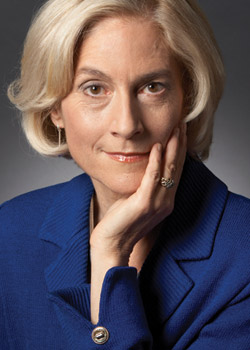
Courtesy of Martha Nussbaum
Martha Nussbaum
Martha Nussbaum, Ph.D. ’75, classical philology
Martha Nussbaum is the Ernst Freund Distinguished Service Professor of
Law and Ethics at the University of Chicago, with appointments in the Law
School, the philosophy department, and the Divinity School. Among the most
eminent of American philosophers, her wide-ranging interests include ancient
notions of ethics, feminism, religious equality, gender and sexuality law,
global justice, and notions of disgust, shame, and other emotions and their
various effects on the law. She has taught at Harvard, Brown, and Oxford Universities.
Among her many books, the most recent are The
Clash Within: Democracy, Religious Violence, and India's Future (2007), Liberty of Conscience: In Defense of
America's Tradition of Religious Equality (2008), From Disgust to Humanity: Sexual Orientation and Constitutional Law
(2010), and Not for Profit: Why Democracy
Needs the Humanities (2010). From 1986 to 1993, Nussbaum was a research
advisor at the World Institute for Development Economics Research, Helsinki, a
part of the United Nations University. She is former president of the Central
Division of the American Philosophical Association; she has chaired the
Association's Committee on International Cooperation, its Committee on the
Status of Women, and its Committee on Public Philosophy. Nussbaum is a member of the American Academy of Arts
and Sciences and the American Philosophical Society, which in 2009 awarded her
its Henry M. Phillips Prize in Jurisprudence.
Centennial Medal Citations
2010
David Bevington ’52, Ph.D. ’59, English
“It is hard to think of a scholar who has done more to make the works of Shakespeare and his contemporaries accessible to the people of this country than David Bevington.” So writes Russ McDonald, president of the Shakespeare Association of America and professor of English at the University of London. Indeed, as perhaps the leading editor and critic of Shakespeare and early modern drama of his generation, Bevington’s influence is deeply felt, and not just among his own former students. Legions of other, more anonymous, though no less grateful beneficiaries can be found in high school and college classrooms everywhere, and on stages around the world—anywhere that Shakespeare is encountered and embraced.
David Bevington is the Phyllis Fay Horton Distinguished Service Professor Emeritus in the Humanities at the University of Chicago, where he has taught since 1967. Among his many achievements, Bevington is editor of the 29-volume Bantam Shakespeare, originally published in 1988 and recently updated, and of Longman’s Complete Works of Shakespeare, sixth edition, from 2009.
He is also the senior editor of the Revels Plays (Manchester University Press), which publishes critical editions of the plays of Shakespeare’s contemporaries, and the Revels Student Editions. And he was the senior editor of the Norton Anthology of Renaissance Drama, published in 2002.
“David is indefatigable,” says his longtime colleague Richard Strier, the Frank L. Sulzberger Distinguished Service Professor at Chicago and a fellow Harvard PhD. “When I tell people that he is retired, they are amazed, since he teaches more than most unretired faculty do, and loves it. He also continues to pour out published work. I don’t know how he does it. Everyone wonders: does this man ever sleep?”
Evidence of Bevington’s continued productivity abounds. For instance, in addition to his recent reediting of the Bantam volumes, Bevington is now at work as one of three senior editors of a forthcoming Cambridge edition of The Works of Ben Jonson. And he is writing another book about Shakespeare, called Murder Most Foul: The History of Hamlet, forthcoming from Oxford University Press.
Among other classroom engagements, he continues to co-teach a two-quarter sequence called "The History and Theory of Drama," covering the ancient Greeks and Shakespeare through Chekhov and Tony Kushner. For many years, his partner in that endeavor was Nicholas Rudall, the founding director of the University of Chicago’s Court Theatre and professor emeritus of classics, who says, “David’s unmatched genius is that he has never stopped being a student. His brilliant scholarship soared, and his passion to teach to this day remains unmatched. But he is the eternal student. My joy is that because of who he is, we taught each other.”
Bevington’s books include Tudor Drama and Politics (1968); Action Is Eloquence: Shakespeare’s Language of Gesture (1985); This Wide and Universal Theater (2007), and Shakespeare’s Ideas: More Things in Heaven and Earth (2008). “His work has set the standard for both historical, textual scholarship and intellectual adventurousness,” says Paul Yachnin, a former advisee who is now the Tomlinson Professor of Shakespeare Studies at McGill University. Bevington has been “foundational in moving the field of Shakespeare and early modern drama studies toward the various rich historicisms that have animated it in recent years,” says another former student, David Scott Kastan, the George M. Bodman Professor of English at Yale, who adds, “His impact is everywhere evident in recent scholarship.”
Bevington’s legacy as a teacher and mentor is celebrated with a special warmth. “Once you are his student, his care and concern never cease,” says David Staines, professor of English at the University of Ottawa, who also holds a Harvard Ph.D. “Long after his classes are over, he is still writing letters of recommendation, advising candidly and well, always eager to know what you are doing. He always puts himself second to the student. And this pattern of behavior, going back to his Harvard years with Alfred Harbage and B. J. Whiting, has won him devoted students for the past fifty and more years.”
Russ McDonald, the Shakespeare Association’s president, uses an analogy drawn from the Bard himself to summarize Bevington’s achievements: “Like Bottom in A Midsummer Night’s Dream, who wants to act the parts of Pyramus and Thisbe and all the others too, David Bevington plays the roles of scholar and editor and bibliographer and annotator and introducer and explicator and critic and historian and undergraduate teacher and graduate supervisor and exemplary colleague—but unlike Bottom, he plays them all brilliantly. And as if those were not enough, he also plays the viola.” Somehow, we’re not surprised.
For your captivating scholarship, for your influential editions of Shakespeare —which have brought his words to life for generations of students in the classroom and on the stage — and for your remarkable presence as a teacher, mentor, and friend in the lives of so many, we honor you today.
Stephen Fischer-Galati ’46, Ph.D. ’49, history
Perhaps more than any other single individual, Stephen Fischer-Galati is responsible for establishing the field of East European Studies in America and around the world. Through his own research, and through his tireless advancement of the work of fellow researchers, as the preeminent publisher in the field, Fischer-Galati is a scholar’s scholar, a generous builder of knowledge, without whom so much that is vital about our understanding of pre-and post-Communist European society would never have come to light.
“There are those people who spend all their lives doing their own writing and their own work, and there are others who share,” says Roman Szporluk, Harvard’s Mykhailo Hrushevs’kyi Professor of Ukrainian History, Emeritus. “Stephen is one who shares. He was an inspirer, and an organizer, and a mobilizer of others to produce work that would be of lasting significance.”
Stephen Fischer-Galati, Distinguished University Professor, Emeritus, at the University of Colorado at Boulder, is a towering figure in the shaping of the history of East-Central Europe. For more than forty years, he was editor of East European Quarterly, a journal he founded to encourage dialogue between and among the many scholars working independently on particular European nations. He is also the founding editor of East European Monographs, which during the past four decades has brought out nearly 800 scholarly volumes by most of the leading historians in the area.
In addition to producing first-rate scholarship of his own, Fischer-Galati “is also an enviable ‘administrator of knowledge,’” says Steven Béla Várdy, McAnulty Distinguished Professor of European History at Duquesne University. “He was instrumental in publishing more books on Eastern Europe than a dozen major university presses combined. Without Stephen, the major libraries of the world would have very little on East Central Europe and the neighboring regions, and the world would be that much poorer.”
Born in Bucharest, Fischer-Galati found his own scholarly interests centered on twentieth-century Romania. His major works include The New Romania: From People’s Democracy to Socialist Republic (1967), Man, State, and Society in East European History (1970), The Balkan Revolutionary Tradition (1981), and Eastern Europe and the Cold War (1994). Among his many international honors, he has received an honorary doctorate from Poland’s Maria Curie-Sklodowska University and from Romania’s University of Craiova, and he has been decorated with the highest civilian honors of both Romania and Hungary. He has also been president of the International Commission for Slavic and East European Studies and president of the Romanian Studies Association, among many other offices.
“In our correspondence over the years, I always addressed Stephen as ‘Comrade-in-Arms,’” says Valentin Boss, Professor of History at McGill University and a fellow Harvard Ph.D., “because this seemed to express his never-yielding efforts on behalf of what was best in East European scholarship. For me, Stephen remains the personification of a rare combination of scholarship and humor, combined in his case with a very high standard for both.”
Through his East European Monographs, distributed by Columbia University Press, he gave young scholars from around the world a vital platform, says Peter Pastor, professor of history at Montclair State University. “Through these publications, academic reputations were established, and careers were launched. After 1989, as academic interest in Eastern Europe ebbed and university presses declined to consider even the works of senior scholars, EEM was there to publish their manuscripts as well.”
As a teacher, “Stephen was challenging, innovative, controversial, charming, and demanding,” says his University of Colorado colleague, Professor of History Robert Hohlfelder. “No student who ever had him as an instructor will forget the experience. He was, and remains, an original.” One of those former students, Herbert Achleitner, recalls him as “the best Doktorvater a graduate student could wish for: devoted to his students, guiding them by providing a well-thought-out theoretical framework, mentoring their research progress, and modelling great teaching.”
He is “an intellectual aristocrat,” Professor Vardy says, “who would have felt at home in the intellectual and cultural world of Franz Joseph’s Multinational Empire, just as much as he did in the America of Harry Truman, John F. Kennedy, and Ronald Reagan. He is a gentle person, whose gentility—as Ben Jonson defined it—“is neither in birth, wealth, manner, nor fashion, but in the mind.”
He is renowned for his sense of humor. And despite his gentility, or maybe because of everything it allowed him to observe, Fischer-Galati has been shrewd—not only in the ways of the world, but in the ways of academe. His colleague Bob Hohlfelder recalls that when he first arrived in Boulder, he asked all his senior colleagues how to have a successful career in the academy. “I received many predictable responses,” Hohlfelder says, “but the only one that I can still remember came from Stephen: “Keep a dossier on everyone you meet!” I don’t know if I ever did that, but in case he might be worried, you can tell him that in honor of this prestigious award, I have burned my file marked Fischer-Galati.’”
For your lifelong commitment to chronicling the history of East and Central Europe, for your tireless support of junior scholars in the field, and for your remarkable legacy as a scholarly publisher, whose works populate the world’s great libraries, we honor you today.
Eric Maskin ’72, Ph.D. ’76, applied mathematics
Eric Maskin was first introduced to what he has called the “striking beauty” of mathematics by his high school calculus teacher in Tenafly, New Jersey. That early mentor is one of a series of teachers, friends, and advisors whom Maskin generously credits with paving his way from Harvard to Stockholm and beyond.
Thanks to that high school teacher, Maskin became a math major at Harvard and almost accidentally came upon a course called “information economics,” taught by Kenneth Arrow, a 1972 Nobel Prize winner who later became Maskin’s Ph.D. adviser. Among other topics from the frontier of economic theory, the course explored Leonid Hurwicz’s work in the emerging field of mechanism design—a revelation. “It had the precision, rigor, and sometimes the beauty of pure mathematics and also addressed problems of real social importance,” Maskin has said—“an irresistible combination.”
Maskin won the Nobel Prize in Economic Sciences in 2007, along with Hurwicz and his Harvard Graduate School classmate Roger Myerson, for helping to lay the foundations of that field he had stumbled upon in those early days at Harvard. Mechanism design theory has had a broad impact, as The Economist has described it, “both in academia—in subjects such as incentive theory, game theory, and the political science of institutions — and in the real world. It affects everything from utility regulation and auctions to structuring the pay of company executives and the design of elections. It goes to the heart of one of the biggest challenges in economics: how to arrange our economic interactions so that, when everyone behaves in a self-interested manner, the result is something we all like.”
Much of Maskin’s early research was in the area of “implementation” theory, which addresses questions of whether, when, and how social goals can be implemented. A vast literature on implementation has since evolved, influenced by Maskin’s groundbreaking analysis.
Eric Maskin has been the Albert O. Hirschman Professor of Social Science at the Institute for Advanced Study since July 2000. But Harvard roots run deep. Jerry Green, the John Leverett Professor in the University and David A. Wells Professor of Political Economy, recalls that he first met Maskin in 1972, when the latter was a senior in Harvard College and Green was a young assistant professor, leading a theory seminar whose particcipants included several of the discipline's future stars. “Eric was as remarkable then as he has been ever since,” Green says.
Maskin went to England for a postdoctoral fellowship at Cambridge, where he worked with Arrow’s collaborator Frank Hahn. Then he joined the economics department at MIT, which as Maskin recalls was still small enough that most of the faculty had lunch together at the faculty club almost every day, around a single large table. “That occasion was always a treat,” he has said. “On any given day, Paul Samuelson or Franco Modigliani might hold forth, with frequent interjections by Bob Solow, to the rapt audience of junior faculty like me.”
Drew Fudenberg, now the Frederic E. Abbe Professor of Economics at Harvard, was Maskin’s PhD student at MIT. “He was doing the stuff no one else at MIT was doing,” recalls Fudenberg, describing his early exposure to new topics in game theory under Maskin’s tutelage. “He was very gracious, very generous with his time — a superb advisor, both intellectually and personally, and an insightful coauthor.”
Maskin is a rarity, says his onetime MIT colleague Peter Diamond, Institute Professor and Professor of Economics. He “operates in the realm of extreme abstraction, but does not lose sight of the connection between theory and reality. Teaching public finance with Eric and researching search equilibrium with him advanced my understanding in both areas. He started outside those subdisciplines and brought insight and a complementary perspective to mine.”
Maskin joined the faculty at Harvard in 1985, becoming part of a remarkable, probably unrivaled group of senior theorists. By the time he left 15 years later, he had mentored a generation of graduate students, many of whom became friends and collaborators. And although one of the reasons Maskin left Cambridge to accept the Institute’s offer was to pull back on teaching and advising responsibilities, he still does plenty of both, to universal acclaim, at Princeton.
“A great scholar is one who can identify good research questions and then, with great care and thought, begin to uncover some of their answers,” says Maskin’s former classmate and co-laureate, Roger Myerson, the Glen A. Lloyd Distinguished Service Professor of Economics at the University of Chicago. “By this vital standard, Eric Maskin is truly one of the greatest scholars I have ever known. Since I was a student and found him already waiting outside our advisor’s office, I have often had the experience of finding what seemed to me an important new research question, only to discover that Eric had already been working on it. His work is always deep and rigorous, yielding fresh insights into the subtle problems of social science. His impact on economic theory has been immense.”
And yet to know Eric’s academic profile is only part of the story, says Jerry Green. “He is a gifted musician (a clarinetist and pianist) capable of playing Scott Joplin just as easily as Mozart. No preparation, no sheet music required,” says Green. Indeed, adds Fudenberg, with a mother who taught at Juilliard and a brother who is a professional oboeist, “Economics was really Eric’s fall-back position.” And a job well done it was.
For your foundational work in mechanism design, for your singular ability to link deeply abstract theories with real-world problems and illuminate both with clarity and precision, and for your collegiality and dedicated mentoring of generations of economists, we honor you today.
Martha Craven Nussbaum, Ph.D. ’75, classical philology
Martha Nussbaum once told an interviewer that among the great comforts of her life were Mahler, Henry James, John Stuart Mill, the poetry of Louise Glück, and the Chicago White Sox. That is as clear a sign as any of the wide-ranging and vividly lived passions of the woman in question—though it is, of course, woefully incomplete.
Nussbaum is one of this country’s most prominent public intellectuals, whose interests span the disciplines of philosophy, classics, law, religion, and political science. Her writings have explored topics ranging from ethics and luck to shame and disgust, from gender equality to animal rights, and from education policy to Indian democracy.
She is the Ernst Freund Distinguished Service Professor of Law and Ethics at the University of Chicago, appointed in philosophy, the law school, and the divinity school. Her work, according to Martha Minow, Dean and Jeremiah Smith, Jr., Professor at Harvard Law School, focuses on three big questions: One, What is the best account of the human experience for purposes of moral philosophy, and how should that account inform law and public policy? Two, How can a conception of human capabilities inform measurements of welfare and of what people can properly demand of their governments? And three, What does the study of the humanities afford legal studies, the academy, and society in general?
“In addressing these questions,” Minow says, “she challenges me and so many others to use our minds and hearts to pursue what most matters.”
The word “heart” may be at the root of Nussbaum’s effectiveness as a writer and thinker. Known for her fearless advocacy of the ideas she believes in, she has often set the academic world abuzz, on all sides of an issue and its politics. Her two most recent books illustrate her bold thinking. From Disgust to Humanity: Sexual Orientation and Constitutional Law, published earlier this year, is an exploration of the legal and moral arguments that drive opposition to gay marriage, identifying—and rejecting—a “politics of disgust” that drives such opposition.
And her latest book, Not for Profit: Why Democracy Needs the Humanities, is a short and powerful manifesto that argues that present threats to the humanities may have dire consequences not just to our educational system, but to our way of life.
Nussbaum’s friend and colleague Diane Wood, a judge of the U.S. Court of Appeals for the Seventh Circuit, describes the impact of such scholarship as broad and energizing. Wood says Nussbaum “has added a human dimension to the legal issues that judges like me face every day. In particular, through her emphasis on capabilities, she has made it impossible to pretend that simple equality norms will suffice in the effort to achieve a just world. It is critical, instead, to find ways to develop the capabilities that make it possible for people to participate as full members of their society. Her work informs a wide range of social and legal policies, including health care, education, and welfare, just to name a few.”
For all of her eclecticism, Nussbaum’s interests are solidly based in classical philosophy, a dedication that itself grew out of a love of ancient drama. Mary Lefkowitz, the noted classicist at Wellesley, where Nussbaum started her undergraduate work, recalls that “all the other students in my course on Plato’s Apology struggled with the language and translated the text word by word as if it were a cryptic puzzle. Martha knew that the text actually had meaning. She translated the Greek into perfect English, with the confidence, intensity, and transcendent sense of purpose that can be seen in all her later work.”
Professor Richard Thomas recalls that when he joined the Harvard Classics Department in 1977, Nussbaum—by then on the faculty—helped to welcome him, and a friendship was born. “We much enjoyed the subversive life of junior faculty in those pre-tenure track days,” he recalls. “And while Aristotle could not contain her academic interests, Martha has never been far from the remarkable thinking and writing of classical antiquity. All she has written—on justice, democracy, the law, as on the emotions, desire, and sex, and everything else—is rooted in those early years so fondly remembered.”
Suzanne Goldberg, clinical professor of law and co-director of the Center for Gender and Sexuality Law at Columbia, recalls meeting Nussbaum when the latter acted as a witness in the litigation against Colorado’s Amendment 2, which later, as Romer v. Evans, became a landmark gay-rights victory in the U.S. Supreme Court. “As she is uniquely capable of doing,” Goldberg recalls, “Martha managed to translate complex scholarly debates about ancient Greek views of homosexuality into accessible and compelling courtroom testimony. Never before, and I suspect never again, will a state courtroom be so thoughtfully engaged about competing translations of ancient Greek and, more importantly perhaps, about how those translations have shaped our understandings of the world today.
“I think of Martha as both a generator and a weaver,” Goldberg continues. “She generates ideas like sparks and then manages to weave them within and across fields so that her classical scholarship synergistically informs her cutting-edge gender and sexuality analysis, and vice versa.”
Several years ago, when asked by The Guardian how she would wish to be remembered, Nussbaum quoted John Stuart Mill, whose last words were reported to be, “I have done my work.” Today it is very clear that Martha Nussbaum has been doing her work, and we are equally confident that there is much more good work from her still to come.
For your deeply insightful analyses of how moral philosophy can inform public policy, for your advocacy of the essential role of the humanities in public life, and for your steadfast dedication to justice and equality, we honor you today.
